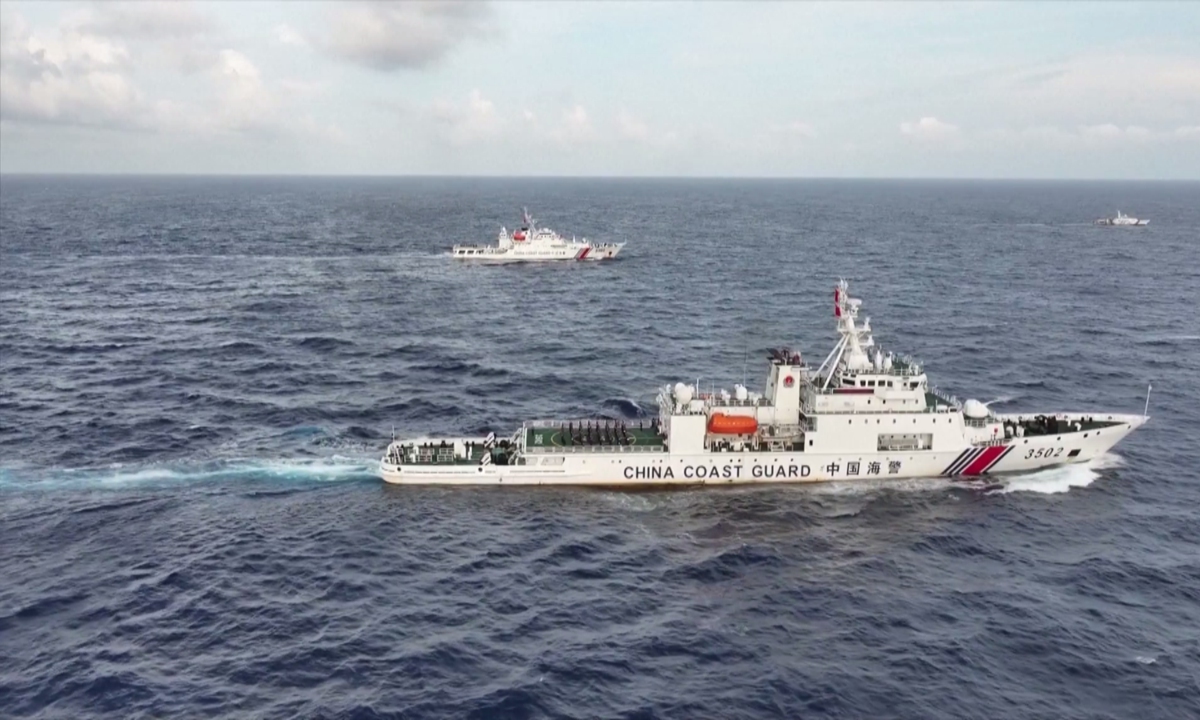
The China Coast Guard holds a flag-raising ceremony to celebrate the National Day on the South China Sea on October 1, 2024. Photo: VCG
Editor's Note:The year 2024 has witnessed regional turmoil and profound landscape changes. From the Russia-Ukraine conflict to the chaos in the Middle East and the interference of external forces stirring tensions in the South China Sea, China demonstrates composure and confidence amid a turbulent landscape, creating a favorable external environment for its high-quality development and injecting valuable stability into a restless world. As a member of the Global South, China is playing an increasingly important role in promoting world development and peace, as well as advancing the rise of the Global South. With 2024 coming to a close, the Global Times (GT) runs a special year-ender series by talking to renowned experts and former diplomats to discuss China's role and the scenes that shaped the global landscape in the past year.
In the second piece of this series, GT reporter Wang Wenwen interviewed Anthony Carty (Carty), an Irish professor of international law. This year, the Chinese version of his book, The History and Sovereignty of South China Sea, was published. The book digs into the official British and French archives and shows China's indisputable sovereignty in the South China Sea. Facing Philippine provocations over China regarding the South China Sea issue, "China knows that patience is the way, and nothing impulsive and impetuous works," he noted.
GT: Looking back at the situation in the South China Sea in 2024, the region has generally remained peaceful, despite the fact that, from early this year, the Philippines has continuously provoked China over the South China Sea issue. How do you evaluate China's response to these provocations and its approach to handling the South China Sea disputes?
Carty: My position is that of an outsider regarding Chinese government policy, but I think that the Chinese government is sufficiently intelligent to realize that the Philippines has in all likelihood been set up to provoke China, with the US behind it.
China is focused on its overall projects for peaceful development, particularly peaceful participation in world trade. China knows that it is much better not to be distracted and to respond in a minimum fashion while continuing its efforts to expand the BRICS and the Belt and Road Initiative and to develop good relations with the Global South countries.
The Chinese strategy is simply not to bring this to a head, it's not in China's interest. It is in the US' interest to instigate a major conflict. If China were to attack the Philippines in a warlike operation, the US would immediately put pressure on the European Union to boycott all trade with China. That's basically the situation. And that would suit America while damaging China significantly.
China knows that patience is the way and that nothing impulsive and impetuous works.
GT: For you, the sovereignty of the South China Sea islands is a legal issue. But now, the South China Sea issue has been exploited as a strategic one by some countries. How does this complicate the situation?
Carty: This is a battle over public opinion. To exploit a situation is to serve a purpose. And the purpose is to build up international opinion hostile to China, by making it appear that China is the "aggressor," and by making it appear that "big China" and the big ships are attacking the "little Philippines" and smaller ships. That's awful. So basically, this is a propaganda game.
It's up to the media and the Chinese government to clarify its legal position. It is also up to the media to expose that the United Nations Convention on the Law of the Sea doesn't make clear the extent to which military operations are permissible in the economic zone of a country.
The tribunal of 2016 is basically a NATO tribunal. There were Polish, Dutch, French and German judges, and some of them are Cold War warriors. This is a global geopolitical game. Within the EU, some countries have investigated the South China Sea issue thoroughly and come to the same conclusion as mine. When the Europeans are considering whether or not to acquiesce in their support of American policy in the South China Sea, they are also thinking about American support against the so-called Russia threat. They're all interlinked. However, there is no Russia threat, according to the most prestigious American strategic analysts like John Mearsheimer and Jeffery Sachs.
Racial prejudice plays a huge role. Most Western academics are deeply prejudiced against China for very traditional racial and ideological reasons.

Anthony Carty. Photo: Wang Wenwen/GT
GT: This year, Washington has stepped up efforts to "support" Manila, including the deployment of the Typhon missile system. In your opinion, what is behind the US' "support" of the Philippines in the South China Sea issue?Carty: Part of the context is that the US is selling weapons to the Philippines. They're not giving them for free. The US has a military-industrial complex; it has a war economy. It survives technologically and financially through selling weapons, and it sells weapons to Germany, the island of Taiwan, Japan, South Korea, and the Philippines that can't afford them. It's a waste of money, and it is in the interests of the US to generate conflict. The position of the US, as I've stated in my book, is that Filipinos have no credible claim to any islands in the South China Sea, but it's in the US interest to encourage them to make claims. And that's what's going on. It's pretty wicked. The US is taking the lead in encouraging the conflict with China that will impede, distract or discomfort China. That has been a clear aspect of American policy since the Korean War. The fundamental problem is: What does a country like China do with a country like the US?
GT: What suggestions would you offer as effective means to resolve the South China Sea issue?
Carty: I would like to see the Chinese embassies in Paris, Berlin and London organizing seminars and encouraging the British, French and German media to take this on board. There will always be somebody who will listen to it. The legal position is completely clear, and the islands, according to our records, all belong to China.
The relevant departments in the Chinese government could establish an international legal forum and a commission that consists of lawyers, historians and political scientists to investigate the entire legal situation. China can have very strong legal arguments, and if it discusses them publicly, I'm sure China will win the arguments. China should have the confidence to challenge the West to come out of the corner. It's crucial for China to win the argument of public opinion. There will be a great deal of support for China in the Global South.
GT: Why do you think the US and the Philippines fail to woo other ASEAN countries against China?
Carty: It's the nature of international relations that countries are sovereign and independent. When country A is in a quarrel with country B, country C is going to want to be neutral. Many of the ASEAN countries are aware that the strategy is to put China in the dog house as an "aggressor" and win them into the general framework of rivalry toward China. Everything has to come down to the US wanting to maintain a strategic superiority over China. It will not accept the fundamental principle of the UN Charter that all states are equal. ASEAN countries are mature enough to realize that.
I read in media reports that there is now a majority view among ASEAN countries that China is a more stable partner for the world than the US. That would be increasingly the case. It was one of the messages coming out of a conference I attended in September. People were looking to China to provide a steady and serene framework for the world, which echoes the concept of a community with a shared future for mankind.

